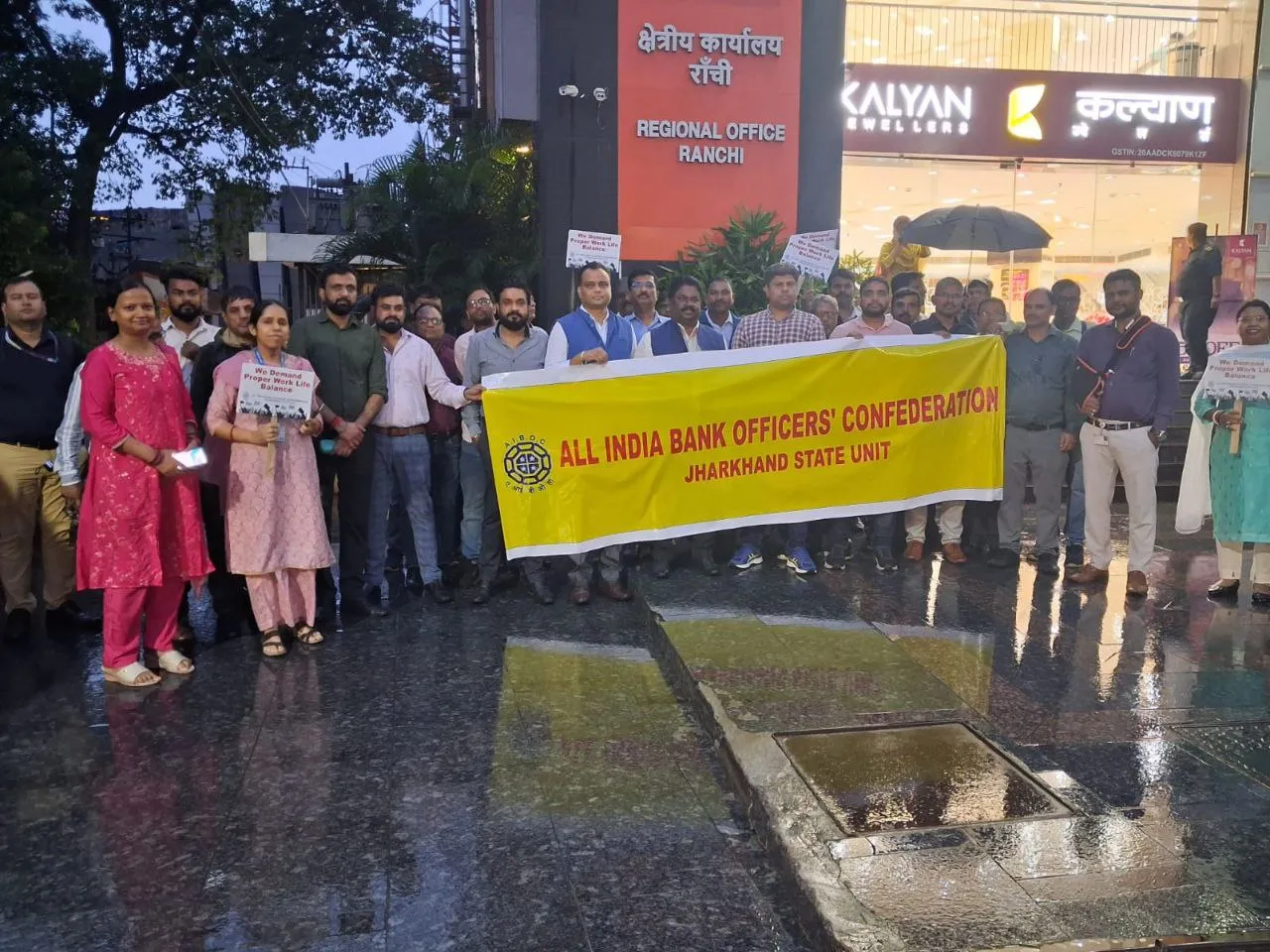Ranchi: The Bank of Baroda Officers’ Association (BOBOA) has announced a protest in Ranchi following the tragic suicide of Senior Manager Shri Iswar Chand Jha. Jha’s death, attributed to relentless work pressure after late-night meetings, has prompted calls for better mental health support in the banking sector.
A Tragic Loss in the Banking Sector
The shocking suicide of Shri Iswar Chand Jha on September 20, 2025, has sent ripples through the banking fraternity. Jha, who was an integral part of the Bank of Baroda in Ranchi, reportedly took his own life due to prolonged work hours and accumulating pressure. This incident has ignited a movement within the Bank of Baroda Officers’ Association (BOBOA), urging for systemic changes in how work-related stress is managed within the banking sector.
During a meeting that extended late into the night on September 19, Jha was overwhelmed by the expectations placed upon him. His work-life balance took a severe hit, with daily routines disrupted and family time sacrificed. Data indicates that a significant portion of employees in the banking sector experience similar stress levels, with issues of mental health often overlooked, raising alarm bells for industry insiders.
A Call to Action: Protesting for Change
In response to this tragedy, BOBOA is organizing a demonstration, emphasizing the need for improved mental health awareness and support structures for employees facing similar pressures. The association has stated, “This incident is a wake-up call for the banking industry. We cannot afford to let our colleagues suffer silently due to unrealistic expectations.”
One protester, who chose to remain anonymous, expressed their concerns: “This is not just about one person but about an entire community. We need our voices heard.” The protest aims to raise awareness not only among the bank’s management but also within the public to foster understanding around the stresses faced by banking professionals today.
Understanding the Impact of Long Hours
Shri Jha’s tragic situation is not an isolated incident. The intense demands of the banking profession often push employees to the brink, leading to burnout and mental health crises. Case studies reveal that professionals in the banking sector frequently work beyond standard hours, sacrificing personal time for professional obligations.
To bring context to this issue, let’s consider the following statistics:
| Factor | Percentage |
|---|---|
| Employees facing high-stress levels | 75% |
| Those experiencing burnout | 60% |
| Employees satisfied with work-life balance | 30% |
As illustrated in this table, the majority of employees in banking report high stress and low satisfaction with their work-life balance, highlighting a systemic issue that needs immediate attention.
Navigating the September Surge
The months leading up to September often see an uptick in work pressure across financial institutions, with organizations scrambling to meet end-of-quarter targets. Jha’s commitment to his job mirrored the dedication of many employees across the sector, who often feel compelled to overextend themselves, leading to devastating consequences.
The tragic loss of Jha follows another alarming incident where Shri Shiv Shankar Mitra, a Chief Manager at the Baramati Branch, took his own life just days before. These heart-wrenching events have amplified discussions around people-centric policy changes in banking to promote mental health awareness, work-life balance, and employee well-being.
The Road Ahead: Creating a Supportive Environment
The Bank of Baroda and other financial institutions must prioritize employee well-being by implementing measures tailored to counteract stress and promote healthier work environments. Recommendations include:
-
Mandatory Mental Health Training: Training sessions for management to recognize signs of employee distress and provide appropriate support.
-
Flexible Work Hours: Implementing policies that allow for flexible work schedules to help employees balance their work and personal lives effectively.
-
Counseling Services: Providing easy access to mental health professionals, which could significantly improve employee morale and wellbeing.
-
Workload Management: Regular assessments of workload distributions to ensure fairness and avoid overburdening employees.
Incorporating these initiatives not only enhances productivity but also creates a more compassionate workplace culture.
Conclusion: A Collective Responsibility
As the banking sector navigates these troubling times, it becomes clear that changes must be made at both organizational and cultural levels. The death of Shri Iswar Chand Jha serves as a grim reminder of the urgent need for the industry to take proactive steps to safeguard its workforce.
The protest by BOBOA in Ranchi is not just an outcry for individual relief but a collective stance demanding systemic change for a more humane banking industry. By addressing mental health, establishing supportive frameworks, and re-evaluating employee expectations, the banking sector can pave the way for a healthier, more sustainable work environment.
Bankerpedia’s Insight 💡
The tragic suicide of a senior manager at Bank of Baroda underscores the urgent need for improved mental health support within India’s banking sector. With increasing work pressures and a culture of long hours, the industry risks losing valuable talent and eroding employee morale. This incident serves as a wake-up call for banks to prioritize employee well-being and work-life balance. Stakeholders must advocate for systemic changes that promote mental health resources. For individuals facing similar stresses, seeking help and open dialogue with management can be crucial steps toward addressing workplace challenges.
How Does This Affect the Banking Ecosystem? 🏦
- Bank Employees → Increased pressure and stress for Bank Employees.
- Bank Management → Increased scrutiny on employee well-being and workplace policies.
- Bank Customers → Increased concern over bank employee mental health impacts service.
- Investors / Shareholders → Increased scrutiny, potential reputational harm, investor confidence may decline.
- Regulators (RBI, SEBI, Govt.) → Increased scrutiny on workplace mental health and regulations.
- General Public → Increased awareness of workplace mental health issues.
Research References 📚
Loved our Research? ❤️
Bankerpedia turns financial confusion into clarity!
Subscribe to our YouTube channel for unbiased insights, financial literacy & practical banking wisdom.









